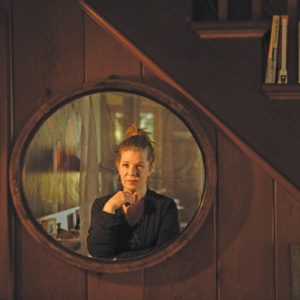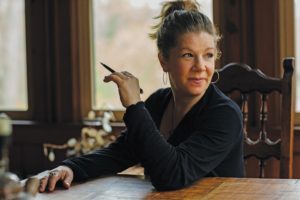In the little town his family has called home for generations, a man holds onto the old ways — including xenophobia. But the fairy-godfather-esque mayor begins to welcome outsiders, and by the time he retires and is succeeded by an immigrant, the once-sleepy town is vibrant and the once-bigoted old man has a new set of eyes.

The tale Dar Williams spins in her song “Little Town,” the fifth track of her 2021 album I’ll Meet You Here, is not a tale as old as time, but she hopes someday it will be.
Though she calls the Hudson Valley home, Williams lived in Wellfleet in 2003 and 2004 and is no stranger to the community centers of the Outer Cape. Over three decades, she has made her name as a folk singer, not in big-city stadiums, but in the music parlors, coffeehouses, and radio stations of little map-dot towns across the country — ours included.
Since she started touring in the ’90s, Williams has witnessed what the song refers to as “the shifting of the sands.”
“Going to all these towns and cities over the years, I watched the downtowns empty out, and then I watched the downtowns return,” she says. “Often, the venues where I was playing were part of the return, so I got a front row seat.”
She has committed her observations to the page as well as the stage. Her book What I Found in a Thousand Towns: A Traveling Musician’s Guide to Rebuilding America’s Communities — One Coffee Shop, Dog Run, and Open-Mike Night at a Time, published by Basic Books in 2017, is an investigation into what makes for a thriving town.
By “thriving,” Williams is careful to point out, she does not mean “gentrified.” What she means, she says, are places that have “what I call the hometown pride, but also a worldly welcome.”
She cites lively music venues as indicators of community health, too. “Our excitement about local venues and our work inside them are drivers of community pride,” she says.
As a performer in these local venues, Williams pushes for democratization, in line with her definition of “thriving.”
“I’ll look at the roster and see my name and my peers’ names, and generally a lot of well-intentioned white folk singers,” she says. “I ask those venues if they can do an open mic, or have some sort of partnership with the schools, or offer their space as rehearsal space for new bands and for local theater.”
She is optimistic about the potential for a more vibrant and diverse small-town America. But she says a lack of democracy in the arts is a symptom of lack of democracy in general. “And I mean democracy in the sense of a vibrant, multi-income, diverse country,” she says — what she’s seen “when this country is at its best.”
Live music and arts, Williams says, can enliven a community and also inspire action. “It can help us remind each other that we’re there,” she says.
The union of new and old in her song “Little Town” — and in her personal philosophy — is the result of a lot of contemplation. Time underscores so many of her lyrics, even dating back to her debut album, The Honesty Room. “You’re Aging Well,” which Williams wrote when she was 25, appears on the 1994 album.
The song seeks to make peace with getting older in a youth-obsessed culture. She revisits it in her latest album, and the 27 years that have elapsed since she wrote it infuse the song with a feeling of satisfaction: We’re so glad that you finally made it here/ You thought nobody cared, but we did, we could tell/ And now you’ll dance through the days while the orchestra plays/ And oh, you’re aging well.
Conversely, “Teenagers, Kick Our Butts,” released in 1997, preaches the raucous wisdom of the young: When the media tries to act your age/ Don’t be seduced, they’re full of rage/ Find your voice, do what it takes/ Make sure you make lots of mistakes.
These ideas aren’t contradictory for a voice as varied and clear as Williams’s — hard and rich one second, light as a feather the next. She sings in celebration of difference and in search of union, both within herself and in the world.
One Song at a Time
The event: Dar Williams in concert
The time: Saturday, July 23 at 7 p.m.
The place: Payomet Performing Arts Center, 29 Old Dewline Road, North Truro
The cost: $32-$45 at payomet.org



